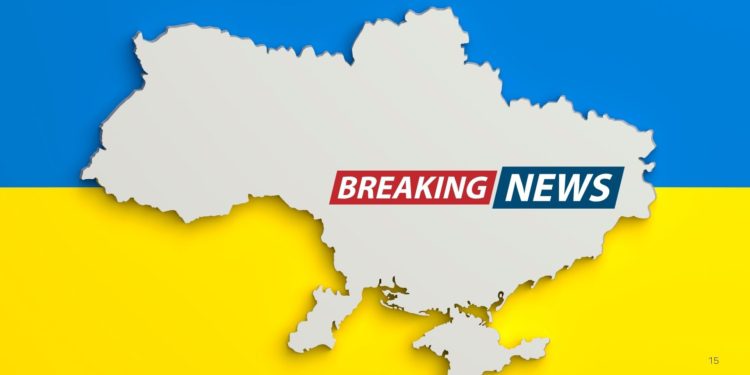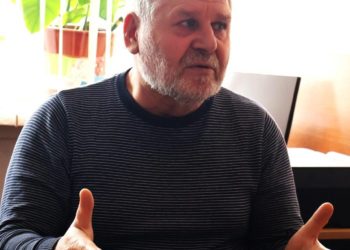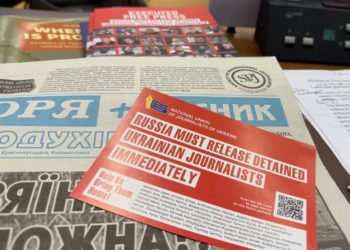2025-04-30. ‘We believe in the power of truth — and we know the world is listening.’ – Despite ongoing threats, challenges and uncertainty, Ukraine’s resolute journalists and newsrooms are not just surviving; they’re adapting, evolving, and reinventing wartime journalism.
‘Journalism is not just a profession in Ukraine today – it’s a frontline of defense against information warfare and a crucial mechanism for establishing historical truth and eventual justice.’ – Sergiy Tomilenko
The war in Ukraine – widely regarded as this century’s first modern war – is also perhaps the most well documented. Equally well documented is the impact of the war on news media, and how resilient journalists and newsrooms have adapted to rise above ongoing threats and challenges.
The Kiev-based Institute of Mass Information maintains an active Freedom of Speech Barometer, and consistently updates its study of Russia’s war crimes against media in Ukraine, launched on the first day of Russia’s invasion.
In March, the National Union of Journalists of Ukraine (NUJU) published From Emergency Measures to Strategic Decisions, comprehensive research that reveals additional critical concerns facing Ukrainian media.
These, along with numerous other studies – including Media Development Foundation’s comprehensive State Of Local News In Ukraine In 2024, and NUJU and Free Press Unlimited’s Close To Zero – collectively illustrate a besieged media landscape facing ongoing existential threats and challenges.
“But progress is being made,” says Oleksii Pogorelov, President of the Ukrainian Media Business Association (UMBA), a WAN-IFRA member association. “After all, the challenges that communities in Ukraine face today are incredible. And to solve them new solutions are needed which, in part, local media not only can, but also effectively, provide.”
WATCH: Local media outlet Zoria (‘Sunrise’ in English) in Zolochiv, Kharkiv oblast, faces constant shelling – yet the newsroom is focusing efforts on helping local people to find work in the neighbouring community, in Bohodukhiv.
Critical concerns: survival and sustainability
The key challenges of wartime reporting are compounded in Ukraine by Russia’s targeted attacks and the approach of the new US administration. “The sudden termination of international funding left many publications with significant debts to printing houses – up to 2,500 EUR in some cases – and unpaid staff salaries. This has created a downward spiral that’s difficult to escape,” explains Sergiy Tomilenko, President of the National Union of Journalists of Ukraine (NUJU).
So the most alarming finding of the NUJU report – that 26% of regional media now operate without paying their staff at all – is perhaps not surprising.
“While this demonstrates extraordinary commitment from our journalists, it’s completely unsustainable and threatens the long-term existence of local journalism,” adds Tomilenko.

Other critical challenges include compromised distribution networks; power outages and technical vulnerabilities, and threatened information security in frontline regions.
“When Ukrainian media outlets close in frontline areas, Russian propaganda immediately fills the void,” explains Tomilenko. “I witnessed this firsthand during my recent visit to Orikhiv in Zaporizhzhia region, where print newspapers remain the only reliable source of information when electricity and internet connections fail.”
Women in the warzone
These pressures are intensified for the women who essentially hold the fort across Ukraine’s media landscape. “Women face not only the risks of war, but also the specific challenges of being women in media,” says Liza Kuzmenko, co-founder of the NGO Women in Media (WIM).
“We’re not just reporting on a war; we’re living through it, often while supporting our families, volunteering, or being displaced ourselves. Yet, despite the fear, fatigue, and grief, Ukrainian journalists continue to do their work with courage and dignity. We believe in the power of truth — and we know the world is listening.”
According to WIM’s 2024 Gender Profile Of Ukrainian Media, women make up 58% of Ukraine’s media workforce, and around 70–80% of journalists.
But, notes Kuzmenko: “There is a lack of men in the media for a number of reasons, including the challenges of military draft, reluctance to be employed officially, and low wages.”

WIM provides comprehensive support for women journalists that stretches from organisational help to psychological and financial assistance, and includes research, training, advocacy – even an Interactive Map Tracking Online Attacks on Women Journalists.
“We didn’t choose this war — but it has accelerated the way we respond to crises and forced us to find creative, often unconventional solutions,” says Kuzmenko. “Ukrainian journalists, especially women, have had to adapt quickly, work under extreme pressure, and invent new ways to stay safe, connected, and effective. This experience may be valuable to the international media community as we all navigate growing threats and uncertainty.”
Resilience through reinvention
By all accounts, the Ukrainian response to war offers invaluable lessons – and hope for what comes after.
“New collaborative models have emerged between media outlets sharing resources and content,” says Tomilenko, citing The Reckoning Project – an international, intersectional initiative to document war crimes while creating high-quality media content.
“There are also other signs of hope: a growing sense of solidarity within the media community; more open conversations about ethics, safety, mental health, and gender equality in the media. All this shows that journalism in Ukraine is not only surviving – it’s evolving and finding new ways to respond to the realities of war.”

One notable transformation is the changing role journalists are playing within their communities, reveals UMBA’s Oleksii Pogorelov: “Journalists are drawing attention to problems, proposing solutions, and influencing changes within their communities,” he says, recounting how journalists in Kotelva, Poltava region, helped the community to self-organise and repair seven emergency bridges, and how local journalists helped residents of Zolochiv in Kharkiv region, find jobs in a neighbouring community.
“This huge change – from simply ‘spreading information’ and ‘informing people’ to ‘engaging and uniting residents’ – is both hopeful and helpful. This inspires journalists themselves, because they see that they are really needed. And it shows residents the power of interaction and the value of quality journalism.”
The fortitude and resilience shown by Ukrainian journalists also illustrates the power of solidarity and collaboration, and why we should continue to provide support wherever possible.
“International solidarity — whether through emergency grants, equipment, safety training, or even just messages of support — has reminded us that our work matters and that the world is paying attention,” says Kuzmenko.
“Personally, it gave me strength to keep going during the hardest moments. Professionally, it helped our organisation stay active, support other women journalists, and continue documenting stories that need to be told — even in times of war.”
More reports and resources
- Ukrainian media landscape 2022-2024 (Academy of the Ukrainian Press)
- List of journalists killed since start of Russia’s full-scale aggression (NUJU)
- In February, the International Press Institute (IPI) released results from a three-year monitoring report Under Attack: Press freedom three years since Russia’s full-scale invasion of Ukraine, which details accounts of journalists killed, injured or arrested, and identifies several key challenges faced by the country’s media.
- The European Broadcasting Union has curated a world first: the Ukraine War Archive. The non-profit collaborative digital preservation platform provides a unified register of materials related to the Russian invasion of Ukraine. With innovative technological and methodological approaches, it serves as a tool for Ukrainian and international organisations to preserve history and fairly represent events in legal, historical, and cultural discourse.
WATCH: How local media is uniting communities and solving common problems
Website of the World Association of News Publishers
by Lucinda Jordaan [email protected] | April 30, 2025

 THE NATIONAL UNION OF
JOURNALISTS OF UKRAINE
THE NATIONAL UNION OF
JOURNALISTS OF UKRAINE
















Discussion about this post